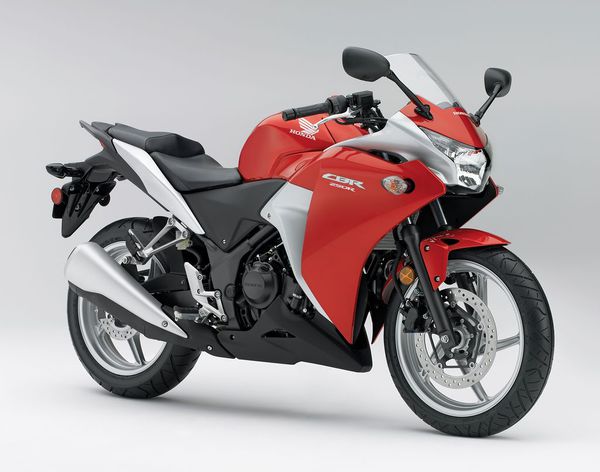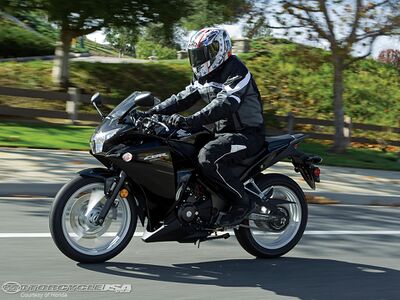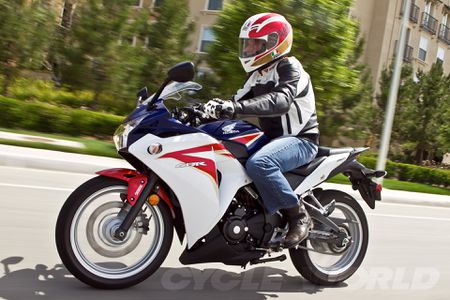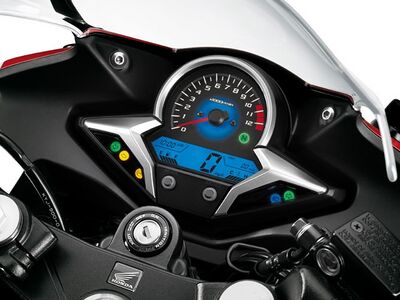Difference between revisions of "Honda CBR250"
m |
m |
||
| (12 intermediate revisions by the same user not shown) | |||
| Line 1: | Line 1: | ||
| − | {{DISPLAYTITLE:Honda CBR250R}} | + | {{DISPLAYTITLE: Honda CBR250R}} |
| − | |||
{{#seo: | {{#seo: | ||
| − | |keywords= | + | |keywords={{PAGENAME}}, review, specs, owners manual, service manual, guide |
| + | |og:image=https://en.enduro.team/images/0/0e/2011-honda-cbr250r-1.jpg | ||
}} | }} | ||
__notoc__ | __notoc__ | ||
| − | [[ | + | [[file: 2011-honda-cbr250r-1.jpg | 600px | center | Honda CBR250R]] |
| − | + | The Honda CBR250R was first introduced in 2011 and was intended primarily for Thailand and India, but is exported to other countries, including Europe and North America. The introduction of the Honda CBR250R was driven by the popularity of the [[Kawasaki_Ninja_250R | Kawasaki Ninja 250R]] and Honda's desire to gain market share in the small budget motorcycle market. | |
| − | + | {{Ads_top}} | |
| − | + | ''' Main competitors: ''' | |
| + | * [[Kawasaki_Ninja_250R | Kawasaki Ninja 250R]] | ||
| − | + | It should be noted right away that the Honda CBR250R model has nothing to do with the [[Honda_CBR250RR | Honda CBR250RR]] model produced for the domestic Japanese market from 1986 to 1996. and having a 4-cylinder engine. | |
| − | + | Unlike [[Kawasaki_Ninja_250R | Kawasaki Ninja 250R]], the Honda CBR250R has a more interesting appearance, reminiscent of the flagship sports tourist [[Honda_VFR1200F | Honda VFR1200F]] and the availability of versions with a combined ABS system, which was luxury. Also, the Honda motorcycle was equipped with a 1-cylinder engine, while Kawasaki installed a 2-cylinder engine, which made the motorcycle not only more serious, but also allowed to give out a little more performance. | |
| − | + | The main feature of the Honda CBR250R is the 249cc, 1-cylinder, liquid-cooled engine producing 26 hp. power and about 24 Nm of torque. The maximum characteristics of the motor were achieved in the range of 6800-10000 rpm. | |
| − | + | Other features of the Honda CBR250R include a steel frame, electronic fuel injection (there were no carburetor versions), simple suspension in the form of a conventional telescopic fork and mono-shock absorber, and a 6-speed gearbox. | |
| − | + | In late 2014, Honda introduced the successor to the Honda CBR250R, which was the [[Honda_CBR300R | Honda CBR300R]], which in appearance resembled the [[Honda_CBR1000RR_Fireblade | Honda CBR1000RR]]. The updated model, just like the previous one, was Kawasaki's answer, but to another model - [[Kawasaki_Ninja_300 | Kawasaki Ninja 300]]. | |
| − | |||
| + | == Photos == | ||
| + | <gallery mode="packed" heights=200px> | ||
| + | File:Honda CBR250R1.jpg| | ||
| + | File:2012-honda-cbr250r-abs-action-pic.jpg| | ||
| + | File:Honda cbr250r ss10 640x480.jpg| | ||
| + | </gallery> | ||
| + | {{Ads_feed}} | ||
| − | + | {{ads_post}} | |
| − | |||
| − | |||
| − | == | + | == Specifications == |
| − | + | ||
| − | + | {| class = "wikitable" | |
| − | + | !scope = "row"|Model | |
| − | |||
| − | {| class="wikitable" | ||
| − | ! scope="row"| | ||
|Honda CBR250 | |Honda CBR250 | ||
|- | |- | ||
| − | | | + | ! scope="row"|Motorcycle type |
| − | | | + | |sport |
|- | |- | ||
| − | | | + | ! scope="row"| Year of issue |
| − | |2011-2014 | + | | 2011-2014 |
|- | |- | ||
| − | | | + | ! scope="row"| Engine type |
| − | |1- | + | | 1-cylinder, 4-stroke |
|- | |- | ||
| − | | | + | ! scope="row"| Working volume |
| − | |249 | + | | 249.4 cubic meters cm. |
|- | |- | ||
| − | | | + | ! scope="row"| Cooling |
| − | | | + | | Liquid |
|- | |- | ||
| − | | | + | ! scope="row"| Bore / Stroke |
| − | |76 | + | | 76 mm x 55 mm |
|- | |- | ||
| − | | | + | ! scope="row"| Number of valves per cylinder |
| − | |DOHC, 4 | + | | DOHC, 4 valves per cylinder |
|- | |- | ||
| − | | | + | ! scope="row"| Fuel supply system |
| − | | | + | | electronic injection (PGM-FI) |
|- | |- | ||
| − | | | + | ! scope="row"| Ignition type |
| − | | | + | | digital transistor |
|- | |- | ||
| − | | | + | ! scope="row"| Maximum power |
| − | |26 | + | | 26 hp at 8500 rpm (23.7 hp at 9900 rpm - on the wheel) |
|- | |- | ||
| − | | | + | ! scope="row"| Maximum torque |
| − | |23 | + | | 23.8 Nm @ 7000 rpm (19.86 Nm @ 6750 rpm - on wheel) |
|- | |- | ||
| − | | | + | ! scope="row"| Transmission |
| − | |6- | + | | 6-speed |
|- | |- | ||
| − | | | + | ! scope="row"| Drive type |
| − | | | + | | chain |
|- | |- | ||
| − | | | + | ! scope="row"| Frame |
| − | | | + | | steel diagonal |
|- | |- | ||
| − | | | + | ! scope="row"| Front suspension |
| − | | | + | | telescopic fork 37 mm (without adjustment), stroke - 130 mm |
|- | |- | ||
| − | | | + | ! scope="row"| Rear suspension |
| − | | | + | | monoshock with Pro-Link progression (pre-tension adjustment), stroke - 103 mm |
|- | |- | ||
| − | | | + | ! scope="row"| Front tire size |
| − | |110/70-17 | + | | 110 / 70-17 |
|- | |- | ||
| − | | | + | ! scope="row"| Rear tire size |
| − | |140/70-17 | + | | 140 / 70-17 |
|- | |- | ||
| − | | | + | ! scope="row"| Front brakes |
| − | |1 | + | | 1 disc 296 mm, 2-piston caliper (optional - ABS combo) |
|- | |- | ||
| − | | | + | ! scope="row"| Rear brakes |
| − | |1 | + | | 1 disc 220 mm, 1-piston caliper (optional - ABS combo) |
|- | |- | ||
| − | | | + | ! scope="row"| Acceleration to 100 km / h |
| − | |8 | + | | 8.0 sec |
|- | |- | ||
| − | | | + | ! scope="row"| Maximum speed |
| − | |170 | + | | 170 km / h |
|- | |- | ||
| − | | | + | ! scope="row"| Motorcycle length |
| − | |2030 | + | | 2030 mm |
|- | |- | ||
| − | | | + | ! scope="row"| Motorcycle Width |
| − | |709 | + | | 709 mm |
|- | |- | ||
| − | | | + | ! scope="row"| Motorcycle height |
| − | |1127 | + | | 1127 mm |
|- | |- | ||
| − | | | + | ! scope="row"| Seat height |
| − | |780 | + | | 780 mm |
|- | |- | ||
| − | | | + | ! scope="row"| Wheelbase |
| − | |1369 | + | | 1369 mm |
|- | |- | ||
| − | | | + | ! scope="row"| Fuel tank capacity |
| − | |13 | + | | 13 l |
| + | |- | ||
| + | ! scope="row"| Motorcycle weight | ||
| + | | 153 kg - dry | ||
| + | |||
| + | 166 kg - equipped | ||
|- | |- | ||
| − | |||
| − | |||
| − | |||
|} | |} | ||
| − | == | + | == Fuel consumption == |
| − | + | Average fuel consumption for the Honda CBR250 in mixed mode is 3.7 liters per 100 kilometers. | |
| − | == | + | == Documentation == |
| − | + | [[Category:Motorcycles]] | |
| − | * [[Honda_CBR250R: | + | * [[Honda_CBR250R:_manuals|Honda CBR250R: manuals]] |
| − | == | + | == == |
| − | + | {{Ads_recomended}} | |
Latest revision as of 12:26, 27 June 2023
The Honda CBR250R was first introduced in 2011 and was intended primarily for Thailand and India, but is exported to other countries, including Europe and North America. The introduction of the Honda CBR250R was driven by the popularity of the Kawasaki Ninja 250R and Honda's desire to gain market share in the small budget motorcycle market.
Main competitors:
It should be noted right away that the Honda CBR250R model has nothing to do with the Honda CBR250RR model produced for the domestic Japanese market from 1986 to 1996. and having a 4-cylinder engine.
Unlike Kawasaki Ninja 250R, the Honda CBR250R has a more interesting appearance, reminiscent of the flagship sports tourist Honda VFR1200F and the availability of versions with a combined ABS system, which was luxury. Also, the Honda motorcycle was equipped with a 1-cylinder engine, while Kawasaki installed a 2-cylinder engine, which made the motorcycle not only more serious, but also allowed to give out a little more performance.
The main feature of the Honda CBR250R is the 249cc, 1-cylinder, liquid-cooled engine producing 26 hp. power and about 24 Nm of torque. The maximum characteristics of the motor were achieved in the range of 6800-10000 rpm.
Other features of the Honda CBR250R include a steel frame, electronic fuel injection (there were no carburetor versions), simple suspension in the form of a conventional telescopic fork and mono-shock absorber, and a 6-speed gearbox.
In late 2014, Honda introduced the successor to the Honda CBR250R, which was the Honda CBR300R, which in appearance resembled the Honda CBR1000RR. The updated model, just like the previous one, was Kawasaki's answer, but to another model - Kawasaki Ninja 300.
Photos
Specifications
| Model | Honda CBR250 |
|---|---|
| Motorcycle type | sport |
| Year of issue | 2011-2014 |
| Engine type | 1-cylinder, 4-stroke |
| Working volume | 249.4 cubic meters cm. |
| Cooling | Liquid |
| Bore / Stroke | 76 mm x 55 mm |
| Number of valves per cylinder | DOHC, 4 valves per cylinder |
| Fuel supply system | electronic injection (PGM-FI) |
| Ignition type | digital transistor |
| Maximum power | 26 hp at 8500 rpm (23.7 hp at 9900 rpm - on the wheel) |
| Maximum torque | 23.8 Nm @ 7000 rpm (19.86 Nm @ 6750 rpm - on wheel) |
| Transmission | 6-speed |
| Drive type | chain |
| Frame | steel diagonal |
| Front suspension | telescopic fork 37 mm (without adjustment), stroke - 130 mm |
| Rear suspension | monoshock with Pro-Link progression (pre-tension adjustment), stroke - 103 mm |
| Front tire size | 110 / 70-17 |
| Rear tire size | 140 / 70-17 |
| Front brakes | 1 disc 296 mm, 2-piston caliper (optional - ABS combo) |
| Rear brakes | 1 disc 220 mm, 1-piston caliper (optional - ABS combo) |
| Acceleration to 100 km / h | 8.0 sec |
| Maximum speed | 170 km / h |
| Motorcycle length | 2030 mm |
| Motorcycle Width | 709 mm |
| Motorcycle height | 1127 mm |
| Seat height | 780 mm |
| Wheelbase | 1369 mm |
| Fuel tank capacity | 13 l |
| Motorcycle weight | 153 kg - dry
166 kg - equipped |
Fuel consumption
Average fuel consumption for the Honda CBR250 in mixed mode is 3.7 liters per 100 kilometers.
Documentation



